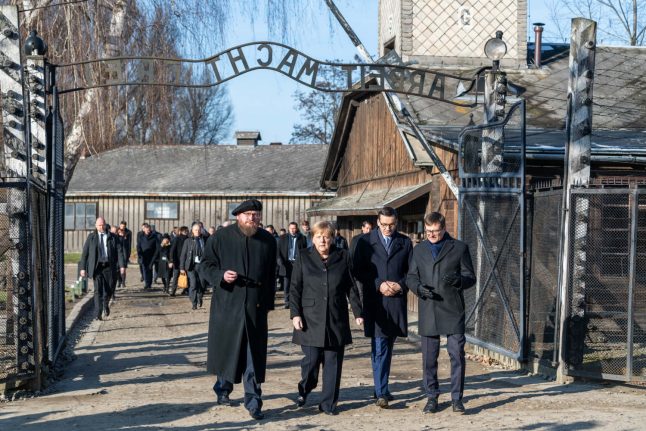Merkel will become only the third German chancellor ever to visit the camp in Poland, with her highly symbolic trip coming ahead of the 75th anniversary of its liberation by Soviet troops on January 27, 1945.
On the eve of her trip, Merkel said that “the fight against anti-Semitism and against all forms of hate” was a priority for her government.
The 65-year-old also promised “determination” from the government in making
Jewish life flourish in Germany.
READ ALSO: Merkel set to visit Auschwitz as Germany battles resurgence of anti-Semitic crime
Merkel began the visit at around 9:30 by walking through a gate bearing the chilling Nazi message “Arbeit macht frei” (Work will set you free).
She will hold a minute's silence by the Death Wall where thousands of prisoners were shot dead.
Merkel will also give a speech during the visit, as well as laying a wreath at the nearby Birkenau camp.
The visit “is a particularly important signal of attention and solidarity at a time when Auschwitz survivors are victims of anti-Semitic insults and hate-filled emails,” said Christoph Heubner, deputy chairman of the Auschwitz International Committee.
Ahead of her trip, Germany's federal states approved a €60 million donation for the Auschwitz-Birkenau Foundation.
Merkel will be accompanied by Polish Prime Minister Mateusz Morawiecki and
a survivor of the camp.
Josef Schuster, head of the Central Council of Jews in Germany, and Ronald
Lauder, head of the World Jewish Congress, will also be taking part in the visit.
A million Jews were killed at Auschwitz-Birkenau, along with 100,000 non Jewish Poles, Soviet prisoners of war, Roma and anti-Nazi fighters.
Many were killed the same day they arrived at the camp.
“There is no other place of memory that demonstrates with such precision what happened during the Shoah,” Schuster told AFP ahead of the visit.

Train tracks leading up to the former concentration camp, photographed on Thursday. Photo: DPA
'Break with civilization'
Merkel has called the Holocaust a “break with civilisation” and has voiced concern about the rise of anti-Semitism in Germany.
Her visit comes two months after an attack aimed at a synagogue in the eastern city of Halle in which two people were killed.
Police figures show that anti-Semitic offences rose by almost 10 percent in
Germany last year from the previous year to 1,646 — the highest level in a
decade.
READ ALSO: 'We must send a signal': Germany to tighten law on anti-Semitic crimes
Violent attacks went up more than 60 percent.
Merkel follows in the footsteps of previous German chancellors Helmut Schmidt, who came in 1977, and Helmut Kohl, who visited in 1989 and 1995.
She has already visited several of the former camps in Germany over many
years and has been to Jerusalem's Yad Vashem Holocaust memorial centre five times.
In 2008, she became the first German leader to address the Israeli parliament. In that speech, she spoke of the “shame” that Germans still feel.
'180-degree shift' in remembrance
Few countries have done as much to memorialize the victims of Nazi crimes
as Germany, and the capital Berlin is dotted with monuments to them.
But the far-right Alternative fur Deutschland party, some of whose members have been accused of using anti-Semitic rhetoric, has called for a rethink of
Germany's culture of atonement for Nazi crimes.
Senior AfD lawmaker, Björn Höcke, has called for a “180-degree shift” in the culture of remembrance.
The timing of the visit is also significant because of questions over Merkel's political future as tensions persist within the governing coalition.
German media reported that she wanted to make the trip ahead of any potential political crisis.
Merkel intends to step down at the end of her mandate in 2021 but there is a chance that the date could be brought forward if her junior coalition partners, the Social Democrats, pull out of the government.




 Please whitelist us to continue reading.
Please whitelist us to continue reading.
Member comments